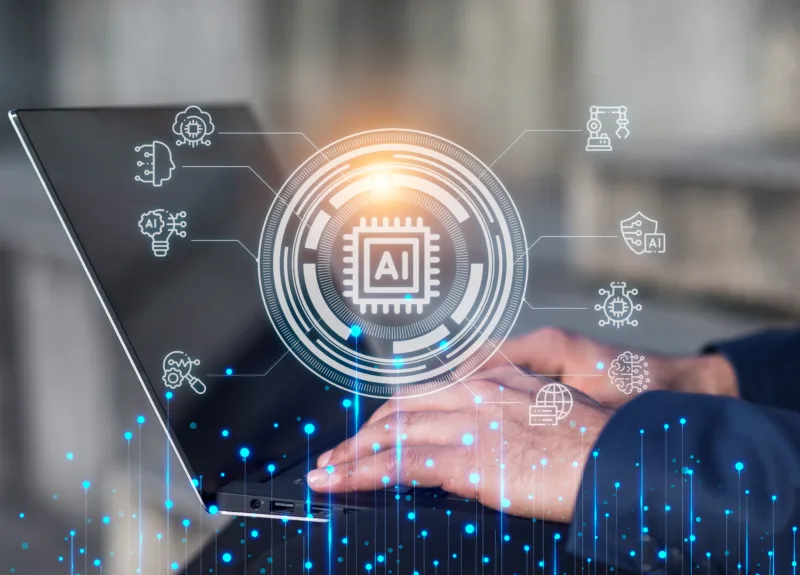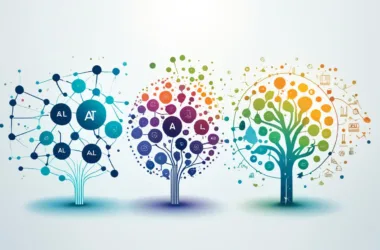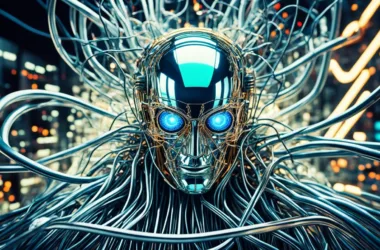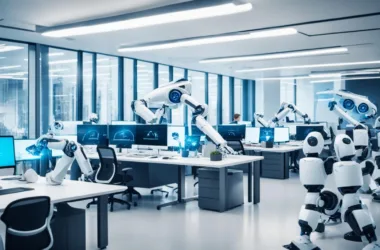Applications of Artificial Intelligence (AI) have emerged as a powerful force driving innovation across industries. Hence, revolutionizing how we approach tasks, processes, and problem-solving has changed.
With its ability to mimic human intelligence and learn from data, AI is transforming diverse fields, from healthcare to finance. Hence, understanding the myriad applications of AI is crucial for grasping its potential to enhance efficiency, productivity, and decision-making in the digital world.
Applications Of Artificial Intelligence In E-Commerce
- Recommendation Systems: AI algorithms analyze customer behaviour, preferences, and purchase history to provide personalized product recommendations. Thus, it helps to increase sales and customer satisfaction.
- Chatbots and Virtual Assistants: AI-powered chatbots assist customers in finding products, answering queries, and completing purchases. It enhances customer support and engagement.
- Dynamic Pricing: AI algorithms optimize pricing based on demand, competitor pricing, and customer behaviour and helps to maximize profits and competitiveness.
- Visual Search: AI-powered visual search allows users to search for products using images. Hence, it improves the search experience and enables faster product discovery.
- Fraud Detection: AI algorithms analyze transaction data to detect fraudulent activities, reducing risks and enhancing security for businesses and customers.
Real-World Example: Amazon uses AI for product recommendations, personalized search results, and dynamic pricing strategies
Applications Of Artificial Intelligence In Finance
- Algorithmic Trading: AI algorithms analyze market data and execute trades quickly. It leverages predictive analytics to identify profitable trading opportunities.
- Fraud Detection: AI techniques analyze transaction data to detect real-time suspicious activities, unauthorized access, or fraudulent transactions. Thus, it enhances security and compliance.
- Credit Scoring: AI models analyze credit history, financial data, and other factors to assess creditworthiness and risk.
- Customer Service Automation: AI-powered chatbots assist customers with tasks such as account inquiries, transaction disputes, or loan applications.
- Risk Management: AI algorithms analyze market trends, economic indicators, and portfolio performance to identify and mitigate investment risks. Hence, it helps investors make informed decisions and optimize their portfolios.
Real-World Example: JPMorgan Chase employs AI to automate fraud detection and risk management, analyzing vast amounts of transaction.
Applications Of Artificial Intelligence In Data Security
- Anomaly Detection: AI algorithms monitor network traffic, user behavior, and system activity to detect unusual patterns from normal behavior. This indicates potential security threats such as intrusions or data breaches.
- Threat Intelligence: AI systems analyze vast amounts of data from various sources. So, it helps to identify emerging cybersecurity threats, vulnerabilities, and attack patterns, enabling proactive defense measures.
- Behavioral Biometrics: AI-powered authentication systems analyze user behavior patterns, such as typing cadence or mouse movements. It verifies user identity and detects unauthorized access attempts continuously.
- Automated Incident Response: AI-driven security platforms automate incident detection, analysis, and response processes. It aims to faster threat containment and minimize the impact of security incidents.
- Adaptive Security: AI algorithms dynamically adjust security policies and controls based on evolving threats, user behavior, and system conditions, enhancing overall resilience and adaptability in cybersecurity defenses.
Real-World Example: McAfee integrates AI into their security software to detect and prevent cyberattacks in real-time.
Applications Of Artificial Intelligence In Travel And Transport
- Route Optimization: AI algorithms analyze traffic data, weather conditions, and historical travel patterns to optimize route planning. Also, it helps for transportation such as airlines, railways, or ride-sharing platforms, reducing travel time and fuel consumption.
- Predictive Maintenance: AI systems analyze sensor data from vehicles, aircraft, or infrastructure to predict equipment failures or maintenance needs, enabling proactive maintenance scheduling and minimizing downtime.
- Dynamic Pricing: AI-powered systems optimize ticket pricing for airlines, hotels, or other travel services based on demand. Also, it supports competitor pricing and market trends, maximizing revenue and occupancy rates.
- Customer Service Automation: AI-driven chatbots and virtual assistants provide real-time assistance to travelers, answering queries, handling bookings, and providing personalized recommendations, enhancing customer satisfaction and loyalty.
- Safety and Security: AI technologies such as computer vision and sensor fusion enable real-time monitoring of transportation networks. Hence, it helps to eliminate potential safety hazards, security threats, or traffic accidents, facilitating timely interventions and emergency response.
Real-World Example: Uber uses AI for trip planning and dynamic pricing, optimizing routes based on traffic conditions and predicting demand.
Applications Of Artificial Intelligence In The Automotive Industry
- Autonomous Driving: AI enables self-driving vehicles to perceive the environment, make decisions, and navigate safely without human intervention. It potentially reduces accidents and improves transportation efficiency.
- Predictive Maintenance: AI algorithms analyze vehicle sensor data to predict potential mechanical issues before they occur, enabling proactive maintenance scheduling and reducing downtime.
- Driver Assistance Systems: AI-powered systems assist drivers with tasks such as parking, lane-keeping, and collision avoidance, enhancing safety and convenience.
- Supply Chain Optimization: AI algorithms optimize inventory management, production planning, and logistics operations in the automotive supply chain, improving efficiency and reducing costs.
- Vehicle Personalization: AI-powered systems analyze driver behavior and preferences to personalize in-car experiences. They include infotainment, climate control, and navigation, enhancing user satisfaction and brand loyalty.
Real-World Example: Tesla pioneering self-driving cars with AI algorithms that process sensor data to navigate roads, recognize objects, and make autonomous driving decisions.
Applications Of Artificial Intelligence In Education
- Personalized Learning: AI algorithms analyze student performance data and learning styles to provide customized learning experiences. Thus, it aims to easily adapt curriculum content, pace, and teaching methods to individual student needs.
- Intelligent Tutoring Systems: AI-driven tutoring systems provide real-time feedback, guidance, and support to students, helping them master complex concepts and improve academic performance.
- Automated Grading: AI-powered grading systems automate the evaluation of assignments, quizzes, and exams. So, it helps save teachers time and provides more consistent and objective feedback to students.
- Adaptive Assessment: AI algorithms adapt assessment tasks based on student responses and performance levels, tailoring the difficulty and content to challenge students at their appropriate skill levels.
- Content Creation and Curation: AI tools generate educational content such as quizzes, interactive simulations, or instructional videos. Thus, it enhances the variety and accessibility of learning materials for students and teachers.
Real-World Example: Duolingo Employs AI to personalize language learning experiences, tailoring lessons to students.
Applications Of Artificial Intelligence In Robotics

- Autonomous Navigation: AI algorithms enable robots to perceive their environment using sensors such as cameras and lidar, make decisions about navigation, and avoid obstacles autonomously.
- Manipulation and Grasping: AI-powered robotic arms use computer vision and machine learning techniques. They help to recognize objects, plan grasping strategies, and precisely manipulate them.
- Collaborative Robots (Cobots): AI enables robots to work safely alongside humans in shared workspaces, assisting with tasks. They include assembly, packaging, or inspection, enhancing productivity and flexibility in manufacturing environments.
- Learning and Adaptation: AI algorithms enable robots to learn from experience, refine their behaviors, and adapt to changing environmental conditions or task requirements.
- Human-Robot Interaction: AI techniques such as natural language processing and emotion recognition enable robots to understand and respond to human commands, gestures, and expressions, enhancing communication and collaboration in human-robot teams.
Real-World Example: Boston Dynamics develops advanced robots powered by AI that can perform complex tasks.
Applications Of Artificial Intelligence In Healthcare
- Medical Imaging Analysis: AI algorithms analyze medical images such as X-rays, MRIs, and CT scans to diagnose, detect abnormalities, and predict disease progression, enhancing the accuracy and efficiency of medical imaging interpretation.
- Clinical Decision Support: AI systems analyze patient data, medical records, and clinical guidelines to assist healthcare providers in making evidence-based decisions about diagnosis, treatment planning, and patient management.
- Remote Monitoring and Telemedicine: AI-powered monitoring devices and telehealth platforms enable remote monitoring of patient vital signs, symptoms, and medication adherence, facilitating early intervention and personalized care delivery.
- Drug Discovery and Development: AI algorithms analyze biological data, molecular structures, and drug interactions to accelerate drug discovery processes, identify potential drug candidates, and optimize drug design.
- Healthcare Operations Management: AI-powered systems optimize hospital workflows, resource allocation, and patient scheduling, improving efficiency, reducing wait times, and enhancing patient satisfaction.
Real-World Example: IBM Watson Health utilizes AI to analyze medical data and patient records, assisting doctors.
FAQs: Applications of Artificial Intelligence
How To Use Artificial Intelligence?
Artificial Intelligence (AI) can be utilized across different industries and domains. Businesses can integrate AI into their operations by implementing AI-powered tools and systems to automate tasks, improve decision-making processes, enhance customer experiences, and drive innovation.
What Are The 4 Types Of AI?
The main types of AI are Narrow AI, General AI (strong AI), Machine learning, Deep learning, Reinforcement learning, Symbolic AI, Generative AI, and Large language models (LLMs). You can learn further details about the types of AI here!
What Is Artificial Intelligence With Example?
Artificial Intelligence (AI) refers to the simulation of human intelligence processes by machines, typically through algorithms and data. An example of AI is machine learning algorithms that analyze large datasets to detect patterns and make predictions.
What Is The Benefit Of Using AI?
The benefits of using AI are manifold. AI can automate repetitive tasks, streamline processes, and improve operational efficiency, saving business time and resources. It can also enhance decision-making by analyzing large volumes of data and providing valuable insights and predictions.
Final Thoughts
In conclusion, Applications of Artificial Intelligence are vast and diverse, offering unprecedented opportunities for innovation and advancement.
As AI continues to evolve, it is poised to revolutionize virtually every aspect of our lives, from how we work and communicate to how we access healthcare and interact with technology.
By harnessing the power of AI responsibly and ethically, we can unlock new frontiers of possibility and create a future that is smarter, more connected, and more equitable for all.






